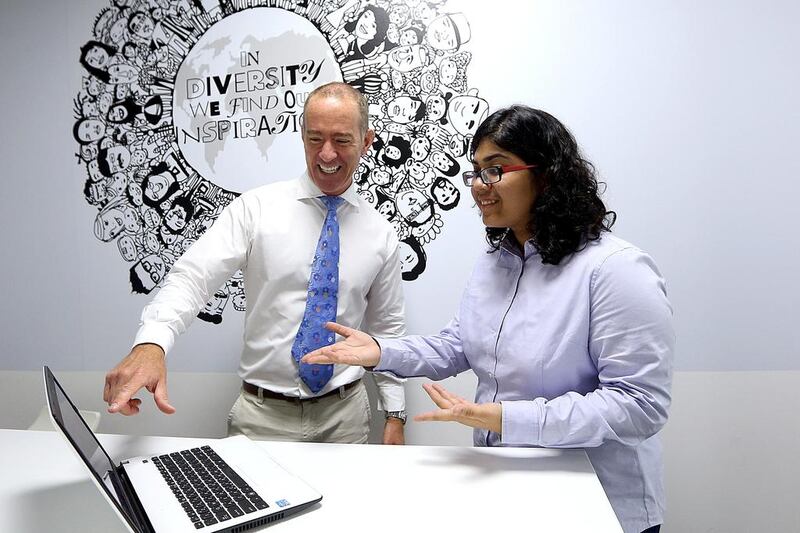It didn’t take Disha Dadlani, who has just finished her second year of studying for a bachelor’s degree in media and communication at Manipal University in Dubai, long to realise that there is quite a jump between classroom learning and putting what you learn into practice.
Ms Dadlani, 19, started a month-long paid internship at the Dubai PR firm Cicero & Bernay in July. When we caught up with her, she was being put through her paces: rotating between departments – getting a feel for the various nuances of doing public relations for automotive, food and beverage, and real estate clients – as well as writing press releases, conducting research and compiling media lists.
C&B has taken on interns for the past few years but this is the first year a structured programme of learning has been put in place.
“Rather than just having the interns come in on an ad hoc basis, we thought it was more beneficial for students to come into a programme that had specific rotation structures [where they can] learn a lot of the basics of PR and get a broad range of exposure,” says Ross Bethell, C&B’s director of strategy. “This really maximises what they get out of it and, for us, they are able to contribute rather than just sit there and hopefully get some work.”
Mr Bethell drew on his own experiences as in intern in Canada 20 years ago to create the scheme, and focuses on mentoring and feedback. Ms Dadlani receives a daily review of her performance from the mentor assigned to her. She also knows she can approach other senior members of staff.
“Agencies and companies have a duty … to give [students] some real world experience and see if that’s a career they want to continue,” he says.
It’s not all a one-way street. Interns also bring fresh ideas to the workplace with them, according to Mr Bethell.
“These students are really familiar with social media brands, what’s hot, what’s cool and celebrities,” he says. “So it opens your eyes to a lot of what’s hip and current right now.”
Of course, internships also allow businesses to make a thorough assessment of their temporary employee, with a view to perhaps hiring them on a full-time basis when they have completed their studies.
Internships give “us the time to observe the performance of the individuals, says Sameer Sultan Al Maskari, the head of nationalisation and business communication at Emirates NBD. “That’s a very great advantage. With the recruitment process there is only the interview and a psychometric test; there is still a high risk of taking the individual in. This is a proper assessment and it’s cost-effective for the organisation.”
Under government guidelines, banks are to increase the Emirati rate on their staff by four percentage points a year, until they reach a target of 40-45 per cent. Internships are a useful way to promote banking (not traditionally a popular career choice among young nationals) as an exciting and challenging profession and to develop a pipeline of potential future employees.
Mr Al Maskari reckons that Emirates NBD takes on between 250 and 300 trainees per year, and 15 per cent of these are former interns.
Likewise at the law firm Clyde & Co, students must demonstrate that they have ties to the Middle East or are willing to work in the region after they finish their studies to be taken on as interns. Top performers this summer will be invited to join the Clyde and Co trainee programme when they have graduated in 2017.
One trend that has emerged recently in the UAE is internships offered by tech firms specifically to boost the future employability of young Emiratis and to create a pool of qualified future employees, according to Ali Mater, the head of talent solutions at LinkedIn Mena.
“We are seeing a trend, particularly in the technology sector, for which internships can create a strong pipeline of talent,” he says. “Another approach is offering UAE nationals structured and quality internships to strengthen their competitive positioning in the job market. Some of them combine these, like the SAP Academy in Dubai, which trains both UAE nationals and other interns on ERP solutions.”
(ERP stands for enterprise resource planning, a business management software that organisations use to collect, store, manage and interpret data from a variety of activities.)
As for Ms Dadlani at C&B, her internship will help inform her choices for the area in which she will specialise next year.
“This internship is a great opportunity to decide and test the water and it’s definitely going to help me make that critical decision,” she says. “It’s been a rewarding experience on the whole – I learn something new every day and I see myself hopefully in the future working in a PR agency.”
business@thenational.ae





